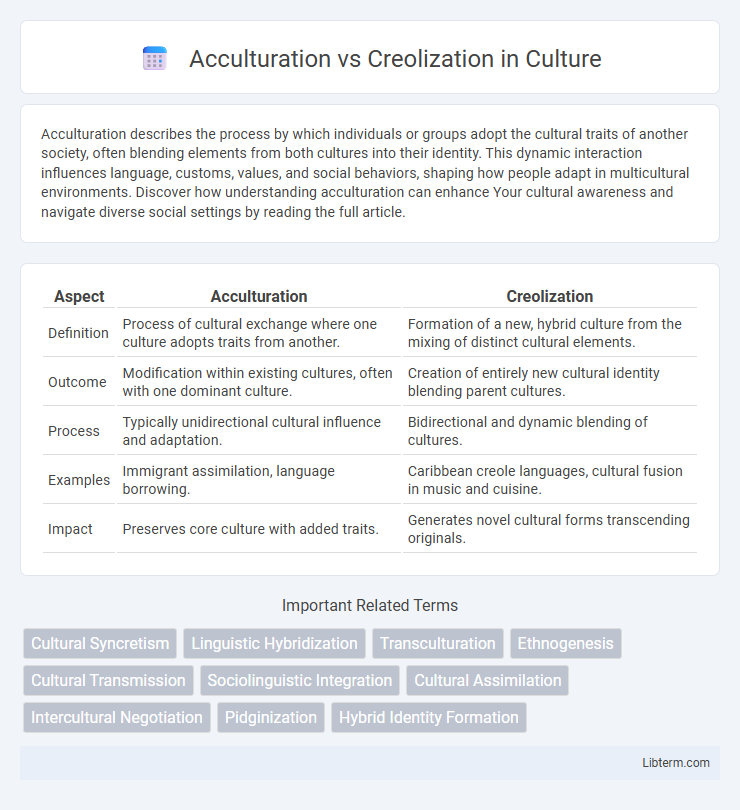Acculturation describes the process by which individuals or groups adopt the cultural traits of another society, often blending elements from both cultures into their identity. This dynamic interaction influences language, customs, values, and social behaviors, shaping how people adapt in multicultural environments. Discover how understanding acculturation can enhance Your cultural awareness and navigate diverse social settings by reading the full article.
Table of Comparison
| Aspect | Acculturation | Creolization |
|---|---|---|
| Definition | Process of cultural exchange where one culture adopts traits from another. | Formation of a new, hybrid culture from the mixing of distinct cultural elements. |
| Outcome | Modification within existing cultures, often with one dominant culture. | Creation of entirely new cultural identity blending parent cultures. |
| Process | Typically unidirectional cultural influence and adaptation. | Bidirectional and dynamic blending of cultures. |
| Examples | Immigrant assimilation, language borrowing. | Caribbean creole languages, cultural fusion in music and cuisine. |
| Impact | Preserves core culture with added traits. | Generates novel cultural forms transcending originals. |
Introduction to Acculturation and Creolization
Acculturation involves the process where one cultural group adopts elements of another culture through direct contact, often resulting in changes to language, customs, and social practices without complete cultural blending. Creolization, by contrast, refers to the formation of a new, hybrid culture that emerges when diverse cultural groups interact and merge, particularly evident in language development and cultural expressions. Understanding these concepts is crucial for analyzing how societies evolve through cultural exchange and transformation.
Defining Acculturation: Meaning and Process
Acculturation refers to the process by which individuals or groups adopt or adapt to the cultural traits or social patterns of another group, often through direct contact and sustained interaction. This phenomenon involves changes in language, customs, values, and behaviors as a result of cultural exchange, frequently occurring in colonized or immigrant communities. Unlike creolization, which results in a new, hybrid culture, acculturation primarily describes the influence and assimilation of one culture by another without necessarily creating an entirely new cultural system.
Understanding Creolization: Origins and Development
Creolization originates from the blending of diverse linguistic, cultural, and social influences resulting in the formation of new, distinct identities and languages, often within colonial and post-colonial contexts. Unlike acculturation, which involves the gradual adoption of cultural traits from one group to another, creolization signifies a more dynamic process of hybridization, producing novel cultural expressions and creole languages. This development reflects complex interactions among enslaved Africans, indigenous populations, and European colonizers, shaping unique socio-cultural landscapes.
Key Differences Between Acculturation and Creolization
Acculturation involves the process where one culture adopts traits or social patterns from another, often dominant, culture without fully blending the two, resulting in partial cultural change. Creolization refers to the complete blending and creation of a new, hybrid culture emerging from the interaction of multiple distinct cultures, particularly seen in language, food, and customs. Key differences include acculturation's tendency towards cultural assimilation or adaptation, while creolization produces entirely new cultural identities and systems.
Historical Examples of Acculturation
Historical examples of acculturation include the Spanish colonization of the Americas, where indigenous populations adopted European languages, religion, and customs under colonial rule. Similarly, the Roman Empire spread Latin language and culture across conquered territories, blending local traditions with Roman practices. The British Empire's influence in India led to the integration of English language and Western education systems while preserving many indigenous cultural elements.
Notable Cases of Creolization in Culture
Notable cases of creolization in culture include the emergence of Haitian Creole, a language blending French with African and indigenous influences, reflecting the island's complex colonial and slave history. The cultural fusion seen in New Orleans jazz combines African rhythms and European musical traditions, illustrating creolization in music. Caribbean cuisine also exemplifies creolization, merging African, French, Spanish, and indigenous culinary techniques and ingredients into distinct regional flavors.
Social and Cultural Impacts of Acculturation
Acculturation leads to significant social changes as communities adapt to dominant cultural norms while retaining elements of their heritage, often resulting in altered social identities and power dynamics. Cultural impacts include language shift, modification of customs, and integration of new practices that reshape collective behavior and values. This process can generate both cultural enrichment and tensions over cultural preservation and assimilation.
Creolization’s Influence on Language and Identity
Creolization profoundly shapes language and identity by blending diverse linguistic elements into new, stable creole languages that reflect hybrid cultural expressions. This process fosters unique social identities by merging ancestral traditions with contemporary influences, challenging static notions of ethnicity and belonging. Creolized languages serve as dynamic symbols of community resilience and innovation in postcolonial societies.
Challenges and Controversies in Acculturation and Creolization
Acculturation often faces challenges such as cultural homogenization, identity loss, and power imbalances where dominant cultures overshadow minority groups. Creolization generates controversies around authenticity, as hybrid cultures challenge traditional purist views and complicate cultural heritage claims. Both processes provoke debates about cultural preservation versus adaptation, highlighting tensions between maintaining original identities and embracing transformative cultural exchanges.
Conclusion: Implications for Multicultural Societies
Acculturation shapes multicultural societies by enabling the adaptation and integration of cultural traits while preserving distinct identities, fostering social cohesion amid diversity. Creolization signifies the emergence of new, hybrid cultural forms that transcend original traditions, promoting innovation and cultural dynamism. Understanding these processes allows policymakers and social scientists to support inclusive frameworks that balance cultural preservation with transformative intercultural exchanges.
Acculturation Infographic

 libterm.com
libterm.com